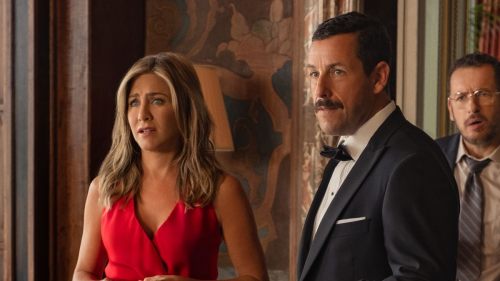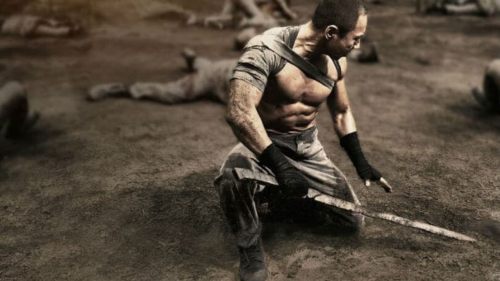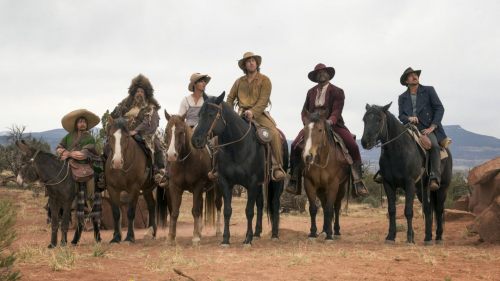Gareth Evans Talks APOSTLE & His Approach To Violence
Introducing Gareth Evans seems redundant for the BMD audience. We all love his Raid duology, and have been patiently waiting for the director to follow up those action picture all-timers with Apostle. A return to the cult horror fascinations he began (with partner in crime Timo Tjahjanto) on the V/H/S 2 segment "Safe Haven", his period-set journey into the heart of religious darkness rocked Fantastic Fest audiences this past week with its World Premiere. Having been lucky enough to catch the movie, this writer penned these words regarding the experience:
"...the Welsh filmmaker's striving script and patient direction imbue this new story of clandestine, nefarious worship with a sense of pastoral horror, ostensibly borrowed in equal measure from the UK mavericks of the '70s (think: Britain’s undervalued Tigon Studios), and Books of Blood era Clive Barker."
I had the chance to sit down with Evans at the fest, and what followed was a quick yet insightful conversation regarding where these cult movies come from, and how he kept his hyper-specific approach to filming gnarly violence intact, despite jumping genres...
*****
Birth.Movies.Death: The world you've created with this film is totally original and your own. It's not an adaptation, and you're the only writer credited on the script. So tell me: where the hell does this cult come from? This is twice now that you've visited this sort of island hell.
Gareth Evans: "Safe Haven" was the first time I got a chance to play in that world, and I was really interested and willing to jump into another sort of filmmaking mode from the one I'm in so often. But then I got an offer to do The Raid 2 after I did [V/H/S 2], so I couldn't turn that down. But after a second Raid movie, I wanted to do something that felt really different. I didn't want to do another action film right away. So, I moved back to Wales, and I was trying to figure out how I could do that and still be based in the UK. Obviously, I didn't want to replicate the same "experience" as "Safe Haven" and wanted it to be a bit more of a patient sit. Then me and Aram [Tertzakian] from XYZ Films started playing with ideas and I'd had in an old short film that I never finished, which contained elements that I wanted to use. There were sermons, and images of rose petals, and things like that, which found their way into [Apostle].
That was the initial gestation. Then we began looking for themes that we could play with; these ideas of politics using religion in order to further political gains. That was a subtext I really wanted to delve into. I knew I wanted it to be period set; an almost Victorian or Edwardian turn of the century type vibe. But we needed historical events to hang our narrative on - a real world reason forThomas to lose his faith, and become almost an atheist. That's when I began reading about the Peking Boxer Rebellion, which was perfect in terms of the story's timeline.
It was kind of like piecing together little pockets of history, but then tossing in the paranoid hypothetical: "what if they were on an island?" Because then you've not only got the fear and dread of being around this cult, but you're also surrounded by strangers and you don't know who you can trust, and you're trapped on an island. You can't escape. We took these pieces and just kept adding information, little-by-little, and building this world up until it was what you saw on screen.
BMD: As you just briefly mentioned yourself, there's a sort of political subtext to the movie that is rather terrifying, regarding the way politics and religion become intertwined, and one uses the other. I don't want to label it out and out "fascism", but you seem fascinated by how suffering is almost demanded by any faith, regardless of whether it's Christianity or a self-made doctrine.
GE: I didn't want to make this movie an attack on believers, because I've got a lot of close friends and family members who are very religious. I have nothing but respect for the these people, because what they don't do is carry their faith on their sleeves during their everyday lives...you know what I mean? I lived out in Indonesia for a long time, where a lot of my friends and a lot of the people I worked with are devout Muslims, but they aren't what we often see in the media in terms of how that faith gets represented. So, I didn't want to do something that was against religion, but rather more about how religions can be perverted by people who have a political motivation. It's the people who are searching for power and a stranglehold on people within a community; how they can use people's faith to corrupt and blind their followers to any sort of misdeeds.
BMD: Can you talk about how you visually approached Apostle? Because your film is so patiently composed at times...and then it explodes into the visceral, tactile violence we've all come to know and love from The Raid movies. It almost felt like you couldn't help yourself once the close quarters combat pops off.
GE: So, my preferred example for this is the scene on the [torture] table near the turn into the movie's third act. That moment is so drastically different to me than how I approached violence in, say, The Raid movies, which were all about visceral adrenaline. Here, the scene is methodical, and it's about pain - most notably the emotional pain of what we're about to see unfold. I want to let let you see exactly how the torture machine works, and make you understand how it functions, and the mechanics of it. But when the actual violence happens, I cut away. I'm going to give you the emotional reaction of the people watching this [public torture] that mean something to the guy on the table. Then, when I do come back around to the actual drilling that's happening, I never let you see it. I only show you the aftermath. The rest is in your head. You fill in the details, which are more powerful than what I could ever film.
For me, it's always about control. It's me figuring out what my barometer is for the level of detail of what I'm going to show. I needed that scene to be emotionally painful, instead of, say, the scene with the "meat grinder", which is a totally different beast, because that is an horror/action beat about two people in a struggle for survival. In that respect, I can lean into the violence a little more, because the scene's back to being about adrenaline, and then ending on a really nasty image. That's the key: what's the tone here? What experience are we trying to give the audience?
BMD: You get a really fantastic performance out of Dan Stevens, who doesn't seem to have shaken off some of his Legion twitchiness when playing [Apostle protagonist] Thomas Richardson. How did you guys go about crafting this character together?
GE: Thomas' nature came about from a conversation Dan and I had before we started shooting, which was: he shouldn't like the hero. We knew that from the jump, but we also wanted him to be vulnerable. Essentially, he's not the right person for this job of finding his sister on this island, but he's the only person there is to do it. So, we created this idea of his mannerisms and the way he may sometimes think he's the hero, but he's always hindered by his dependency on laudanum. The way he speaks, through this tightened his jaw, is muffled and cheeky up until a pivotal moment of the film. But once he makes the decision to commit to this task, and becomes sober, there's a clarity that takes over. His jaw muscles suddenly loosen up. For me and Dan, it was all about putting Thomas through the ringer, and then seeing what's left of him.
BMD: In a way, it's a story about a broken man finding purpose, but still being very broken.
GE: Exactly. And Dan plays it terrifically.
Apostle hits Netflix October 12th.



